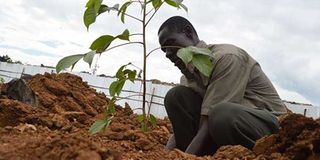Let conservation begin with you if it has not already

A man plants a tree at the reclaimed Kachok dumpsite in Kisumu. Conservation requires a level of selflessness and the ability to choose a simple lifestyle that supports the environment. PHOTO | FILE | NATION MEDIA GROUP
What you need to know:
- When you who knows creates systems that encourage positive environmental behaviours in people and persist in doing them, they will begin, albeit slowly, to imitate them.
- Our country’s laws and policies may not fully support behaviours like waste segregation and recycling.
The sun is already setting on 2018 and November is, by and large, the most opportune month to reflect on one’s year.
There’s ample time to go through your hits and misses, and enough time to think and plan for the upcoming year before the festivities begin and resolutions take the back burner.
When we do these reflections, we always focus on our personal or career actions.
But have you ever thought of having personal goals with regard to the environment?
If you were to stand in front of an Environment court charged with offences against the environment, and the Environment could talk, would it defend you based on your actions or push for your prosecution? Would there be evidence enough to save you from the prosecutor?
POWER OF CONSERVATION
When it comes to environmental conservation, we cannot underestimate the power of one.
It took one woman — Rachel Carson — through her book, Silent Spring, to birth environmentalism after she created awareness that human beings were harming the environment. Similarly, each of us can have a lasting impact on nature with just one action.
Because the environment is communal, we forget that we are individually responsible for the condition of our immediate environment and that a single individual can influence hundreds, if not thousands, in the right direction.
Like other behaviours, environmentally positive behaviours can be learnt over time through association or observation. This goes to show that environmental protection begins with knowledge. You who know about the importance of conservation are the beginning point or catalyst for those around you who may not know or don’t care. In fact, the late Wangari Maathai put it exceptionally well: “I always say that the burden is on those who know. We are the ones who must take action.”
POSITIVE BEHAVIOUR
When you who knows creates systems that encourage positive environmental behaviours in people and persist in doing them, they will begin, albeit slowly, to imitate them.
However, it is not enough that they do what you are doing, they must understand why.
The ‘why’ is what will keep these behaviours going even when you are not around. The ‘why’ is empowering and creates value. People cannot protect the environment unless they value it and are empowered. This begins with information.
The ‘why’ also causes people to grasp the reality that the environment is theirs and they must jealously guard it.
You may find that you did many great things for the environment in 2018; you planted trees, supported environmental causes and ran a marathon. Well, continue on and be an influencer.
You may also find that your score isn’t so environmentally friendly and could be wondering how you can begin this journey come 2019.
First, conduct a self evaluation.
What are your thoughts about the environment? What is their basis? The more you understand your foundation, the more you can change.
ECO-FRIENDLY
Second, decide on a SMART eco-friendly goal and accompanying simple activities. You can start by having a water bottle instead of buying bottled water, eating in instead of packing your meal, reusing to cut down waste production, switching off electricity when you’re not using it, using energy-saving bulbs and binning your trash.
Third, understand that conservation requires a level of selflessness and the ability to choose a simple lifestyle that supports the environment.
It must be a sober commitment. The key to doing this is being intentional. Daily. In case you’re thinking it is impossible, we thought we would not survive the plastic bag ban! We did.
Our country’s laws and policies may not fully support behaviours like waste segregation and recycling but if we create demand for such infrastructure, the leadership will have no other option but to provide it.
Finally, there are two categories of individuals: Those who believe in personal responsibility, and those who don’t. Choose who of the two you will be in 2019 and beyond.
Ms Wanjohi is the founder of Mazingira Safi Initiative. purity- [email protected]





